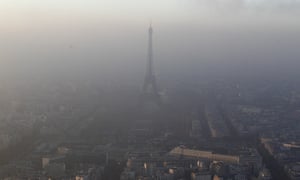Mayor wins long-running battle to introduce emergency traffic bans when pollution from vehicles reaches dangerous levels

Kim Willsher
The mayor of Paris, Anne Hidalgo, has won a long-running battle with the French government to introduce emergency traffic bans in the city when air pollution spikes.
The move to speed up the introduction of alternate driving days for cars with odd and even number registration plates was announced after pollution spiked in the French capital on Monday, just weeks before the city is due to host a crucial UN climate change summit.
The ecology minister, Ségolène Royal, had previously said the measure should only be applied after three consecutive days of low air quality.
Parisians have criticised the government on social media for a perceived failure to act over predictions of dangerous levels of pollution from diesel fumes.
But on Monday evening, Royal broke her silence to announce that the alternate vehicle ban would come into immediate effect “when the region and the city authorities demand it”.
The issue has been the subject of a long-running dispute between the two leading Socialists; Hidalgo approves of the bans but Royal has, until now, insisted they are not the answer to the frequently toxic air quality that transforms the City of Light into the capital of gloom.
Royal told Europe 1 radio that she had decided to put her trust in (local) elected officials, who she said were in “closer contact with those living in the city”.
In the event, Airparif, an independent group that monitors the city’s air quality, said Monday’s pollution was less serious than expected because of higher winds than forecast.
However, the police authorities reduced speed limits on the motorways and major roads around the capital.
Earlier this year, Paris was briefly more polluted than Shanghai – one of the world’s most polluted cities – when a cloud of noxious smog enveloped many of the capital’s icons including the Eiffel tower.
Advertisement
On Sunday, with weather and pollution experts warning that air quality was set to be poor once again, Hidalgo and the Socialist president of the region, Jean-Paul Huchon, insisted the “alternate traffic” rule should be enforced immediately the following day.
Hidalgo, who has made combating pollution a pillar of her mayoral programme, intends to ban vehicles from the main highway along the right bank of the river Seine from next year, to the fury of motoring organisations. She is also planning more “car-free” days across the city after declaring the first such event at the end of September a success.
In the last year, the level of nitrogen dioxide (NO2) on the riverside near Place de la Concorde has regularly topped 100µg/m3 with an average of 66µg/m3 over the year – well above the EU limit of 40µg/m3.
France has flouted European Union air quality targets since 2005, while Airparif reported that pollution levels were up to double those allowed by regulations. Five pollutants pose a problem in the capital: benzene, nitrogen dioxide, ozone and the fine lead particles PM10 and PM2.5.
French researchers estimate air pollution costs France about €101.3bn (£75bn) a year in health, economic and financial damage.

